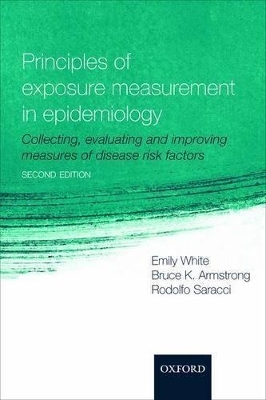
Principles of Exposure Measurement in Epidemiology
Oxford University Press (Verlag)
9780198509851 (ISBN)
The second edition of this internationally acclaimed title is the ideal handbook for those involved in conducting epidemiological research. The objective of most epidemiological studies is to relate exposure to putative causal agents to the occurrence of a particular disease. The achievement of this objective depends critically on accurate measurement of exposure. This book reviews principles and techniques that can be applied to measuring a wide range of exposures, including demographic, behavioral, medical, genetic, and environmental factors. The book covers questionnaire design, conducting personal interviews, abstracting information from medical records, use of proxy respondents, and measurements from human specimens and in the environment. It gives a comprehensive account of measurement error and the estimation of its effects, and the design, analysis, and interpretation of validity and reliability studies. Emphasis is given to the ways in which the validity of measurements can be increased. Techniques to maximize participation of subjects in epidemiological studies are discussed, and ethical issues relevant to exposure measurement are outlined.
Emily White has conducted research at the Fred Hutchinson Cancer Research Center for almost 25 years, and has published widely on nutrient intake and other lifestyle factors in relation to breast, colorectal, lung, prostate, bladder and skin cancer, as well as on the methodology of exposure measurement. She received her Master's degree in Biostatistics and her PhD in Epidemiology from the University of Washington. Bruce Armstrong is known internationally as an authority on the causes and prevention of skin cancer and melanoma, and has made important contributions to knowledge on the causes and control of other cancers, high blood pressure and heart disease. His present research interests are the genetic and environmental epidemiology of cancer, and the quality and performance of cancer services. Bruce was appointed a Member of the Order of Australia on Australia Day 1998 for services to medicine through research in cancer epidemiology, elected a Fellow of the Australian Academy of Science in 2000, honoured in 2005 at the 6th World Congress on Melanoma in Vancouver with an award for a lifetime of achievement in basic research into melanoma, and given the inaugural New South Wales Premier's award for Outstanding Cancer Researcher of the Year 2006. Bruce did a PhD with Sir Richard Doll at Oxford University. He is former Deputy Director of IARC and Director General of Health in Western Australia Rodolfo Saracci worked for thirty years (1976-2006) as Chief of Analytical Epidemiology and later as consultant at the WHO International Agency for Research on Cancer, Lyon. He is currently Adjunct Professor, University of Aarhus (Denmark), and has been director since 1988 of the summer didactic programme "European Educational Programme in Epidemiology" (Florence,Italy). He has authored some two hundred publications in Medline, most on cancer as related to environment and nutrition, and on empirical research on ethical issues in medicine & epidemiology. His qualifications/awards include Former President (1996-99) International Epidemiological Association; Founder and Emeritus Member, Italian Association of Epidemiology (AIE, Associazione Italiana Epidemiologia); currently Associate Editor, International Epidemiological Association; and Former Member of editorial boards 'American Journal of Epidemiology' and 'Epidemiology'.
1. Exposure measurement ; 2. Methods of exposure measurement ; 3. Exposure measurement error and its effects ; 4. Validity and reliability studies ; 5. Reducing measurement error and its effects ; 6. The design of questionnaires ; 7. The personal interview ; 8. Use of records, diaries, and proxy respondents ; 9. Measurements in the human body or its products ; 10. Measurements in the environment ; 11. Response rates and their maximisation ; 12. Ethical issues
| Erscheint lt. Verlag | 28.2.2008 |
|---|---|
| Zusatzinfo | 25 black and white line illustrations |
| Verlagsort | Oxford |
| Sprache | englisch |
| Maße | 156 x 234 mm |
| Gewicht | 664 g |
| Themenwelt | Mathematik / Informatik ► Informatik ► Datenbanken |
| Medizin / Pharmazie ► Gesundheitswesen | |
| Studium ► Querschnittsbereiche ► Epidemiologie / Med. Biometrie | |
| ISBN-13 | 9780198509851 / 9780198509851 |
| Zustand | Neuware |
| Informationen gemäß Produktsicherheitsverordnung (GPSR) | |
| Haben Sie eine Frage zum Produkt? |
aus dem Bereich


